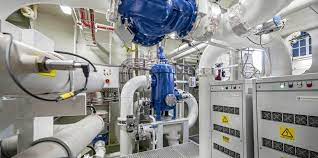Blog Post
What is Ballast Water Management System?
Posted By: Harsh Bamnolia
Posted On : 21-Dec-2023

Introduction to Ballast Water Management
Imagine a behemoth traversing the vast ocean, defying gravity with unwavering stability. This feat owes much to a hidden guardian – the ballast water management system.
But what exactly is ballast water management, and why is it critical for both ship safety and environmental well-being? Unraveling these questions unlocks a fascinating chapter in maritime responsibility, one that safeguards the delicate balance of our oceans.
Delving into the Depths: What is a Ballast Water Management System?
Ships rely on ballast water to maintain equilibrium, adjusting for fluctuating cargo or fuel loads. This water, pumped in from diverse ports and harbors, becomes a silent passenger, often harboring a multitude of aquatic organisms – from microscopic plankton to fish larvae and even resilient bacteria.
Unfortunately, these stowaways, when released in a new environment, can wreak ecological havoc. Invasive species, introduced through unmanaged ballast water, disrupt delicate food webs, displace native fauna, and alter habitats, leading to widespread ecosystem imbalances and biodiversity loss.
To combat this ecological threat, ships employ ballast water management systems (BWMS). These technological champions act as sentinels, neutralizing the unwelcome passengers carried within ballast water. Diverse treatment methods exist, each tackling the problem with unique solutions.
Physical Filtration: Imagine a microscopic colander sifting through the water. Certain BWMS utilize finely meshed filters to capture larger organisms like plankton and juvenile fish, preventing their introduction into new ecosystems.
Ultraviolet Radiation: Picture the sterilizing power of sunlight concentrated a thousandfold. BWMS equipped with UV lamps subject the water to intense ultraviolet radiation, effectively disrupting the DNA of microorganisms, rendering them inactive and harmless.
Chemical Disinfection: Think of a microscopic battlefield, where controlled doses of oxidizing agents like chlorine or ozone neutralize pathogenic bacteria and other harmful microbes. This method effectively reduces the risk of disease transmission through ballast water.
Ballast Water Exchange: While not a treatment method per se, ballast water exchange remains a viable transitional option under specific circumstances. This technique involves replacing water taken in from coastal areas with open-ocean water, assumed to contain fewer organisms due to its distance from land-based sources of contamination.
These methods, alone or in combination, form the arsenal of ballast water management, ensuring the protection of marine ecosystems from the unwelcome influx of invasive species and harmful pathogens.
Why is Ballast Water Management a Global Mandate?
The importance of ballast water management transcends mere environmental concerns. Unchecked, invasive species can wreak havoc on economies, causing millions of dollars in damage to fisheries, aquaculture, and infrastructure.
For instance, the zebra mussel, introduced through ballast water, clogged water intake pipes in North America, costing billions in repairs and lost revenue.
Recognizing these dangers, the International Maritime Organization (IMO) stepped in. In 2004, the IMO adopted the International Convention for the Control and Management of Ships' Ballast Water and Sediments (BWM Convention), a landmark treaty setting stringent standards for ballast water treatment.
The BWM Convention mandates all ships to be equipped with approved BWMS, effectively turning the tide against the spread of invasive species and pathogens through ballast water.
This pivotal convention entered into force in 2017, marking a significant turning point in our collective effort to protect the health of our oceans. With regulations in place and technology readily available, ballast water management is no longer an option; it's a global responsibility.
Beyond Compliance: Embracing Sustainability
While adhering to regulations is crucial, true sustainability demands going beyond the bare minimum. Choosing eco-friendly BWMS options, actively researching and developing cleaner treatment methods, and fostering responsible shipping practices are all crucial steps towards a healthier future for our oceans.
Marinetech Safety & Shipping Corporation stands at the forefront of this mission. We offer a comprehensive range of high-performance, environmentally friendly BWMS, ensuring compliance with international regulations while protecting the ecosystems upon which life depends.
From expert consultation to seamless installation and ongoing maintenance, Marinetechss is your trusted partner in navigating the future of responsible shipping.
Visit https://marinetechss.com/services/bwms-sales-and-service today to learn more about our BWMS solutions and how we can help you become a champion for clean oceans and sustainable shipping.
Remember, a healthier ocean starts with informed action. By understanding what ballast water management is and why it matters, we can collectively choose sustainability, ensuring a vibrant future for generations to come.
Let's join hands and become guardians of the deep, one ship, one treated ballast water discharge at a time.